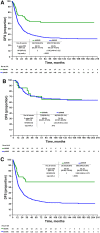Is Adjuvant Chemotherapy Necessary for Patients with Deficient Mismatch Repair Gastric Cancer?-Autophagy Inhibition Matches the Mismatched
- PMID: 32058649
- PMCID: PMC7356708
- DOI: 10.1634/theoncologist.2019-0419
Is Adjuvant Chemotherapy Necessary for Patients with Deficient Mismatch Repair Gastric Cancer?-Autophagy Inhibition Matches the Mismatched
Abstract
Purpose: The use of microsatellite instability (MSI) and mismatch repair (MMR) as predictive biomarkers for fluorouracil-based adjuvant chemotherapy in colorectal cancer has been a paradigm shift. However, whether this applies to gastric cancer is questionable. Furthermore, we herein investigated whether and how autophagy plays a role in MSI-relevant chemoresistance.
Materials and methods: A total of 929 patients with deficient MMR (dMMR) and proficient MMR (pMMR) gastric cancers who underwent curative-intent gastrectomy were enrolled. We compared clinicopathological variables and survival among dMMR and pMMR cohorts and tested the responses of MSI-high and microsatellite stable (MSS) gastric cancer cell lines to 5-fluorouracil (5-FU) with or without chloroquine, an autophagy inhibitor.
Results: We identified an 8.9% prevalence of dMMR cases (83 out of 929) in our cohort. This was associated with old age, tumor site at the distal stomach, an intestinal phenotype, fewer nodal metastasis, and early pathological stages. MMR was an independent prognostic factor after multivariate adjustment. Overall survival (OS) of dMMR patients was better than that of the pMMR patients but was only applicable to stage III patients. There was no difference in OS between dMMR patients treated with or without adjuvant chemotherapy, although the latter showed more medical morbidities. The MSI-high gastric cancer cell lines, versus the MSS counterparts, displayed increased resistance to 5-FU and increased autophagy. Interestingly, autophagy inhibition abrogated the chemoresistance.
Conclusion: Our data show that fluorouracil-based adjuvant chemotherapy does not work for dMMR cases, if not worse. Autophagy inhibition and/or immune checkpoint inhibition might be promising alternative strategies for gastric cancer treatment.
Implications for practice: The use of microsatellite instability (MSI) and mismatch repair (MMR) as predictive biomarkers for adjuvant chemotherapy in colorectal cancer has caused a paradigm shift in cancer therapy, although its implications in gastric cancer are still questionable. The data obtained in the current study indicate that MSI-MMR is an independent prognostic factor for gastric cancer. Standard fluorouracil-based adjuvant chemotherapy did not work for deficient MMR cases, and was likely worse. Instead, strategies like autophagy inhibition and/or immune checkpoint inhibition should be taken into consideration in the future.
Keywords: Autophagy; Gastric cancer; Microsatellite instability; Mismatch repair.
© AlphaMed Press 2020.
Conflict of interest statement
Figures




References
-
- Torre LA, Bray F, Siegel RL et al. Global cancer statistics, 2012. CA Cancer J Clin 2015;65:87–108. - PubMed
-
- Cristescu R, Lee J, Nebozhyn M et al. Molecular analysis of gastric cancer identifies subtypes associated with distinct clinical outcomes. Nat Med 2015;21:449–456. - PubMed
-
- Baretti M, Le DT. DNA mismatch repair in cancer. Pharmacol Ther 2018;189:45–62. - PubMed
-
- Choi YY, Bae JM, An JY et al. Is microsatellite instability a prognostic marker in gastric cancer?: A systemic review with meta‐analysis. J Surg Oncol 2014;110:129–135. - PubMed
Publication types
MeSH terms
LinkOut - more resources
Full Text Sources
Medical

